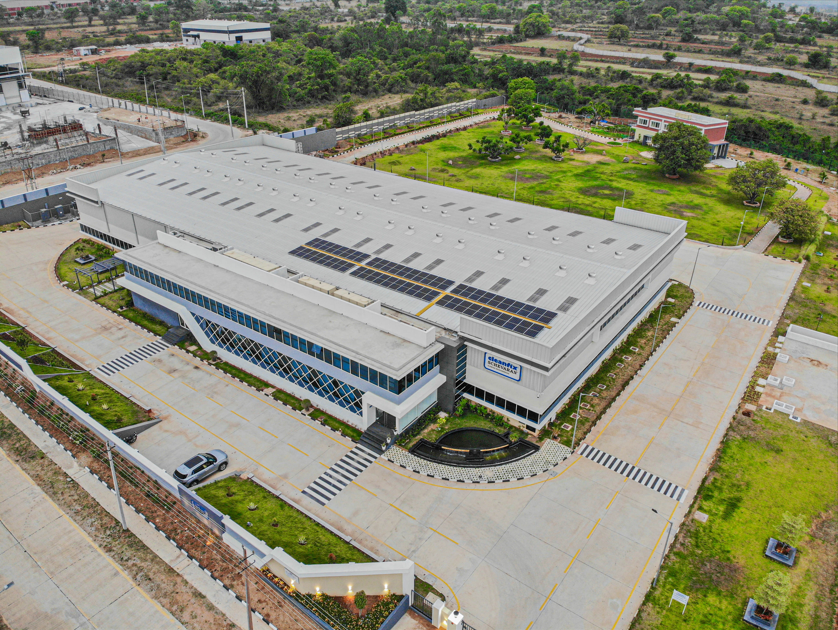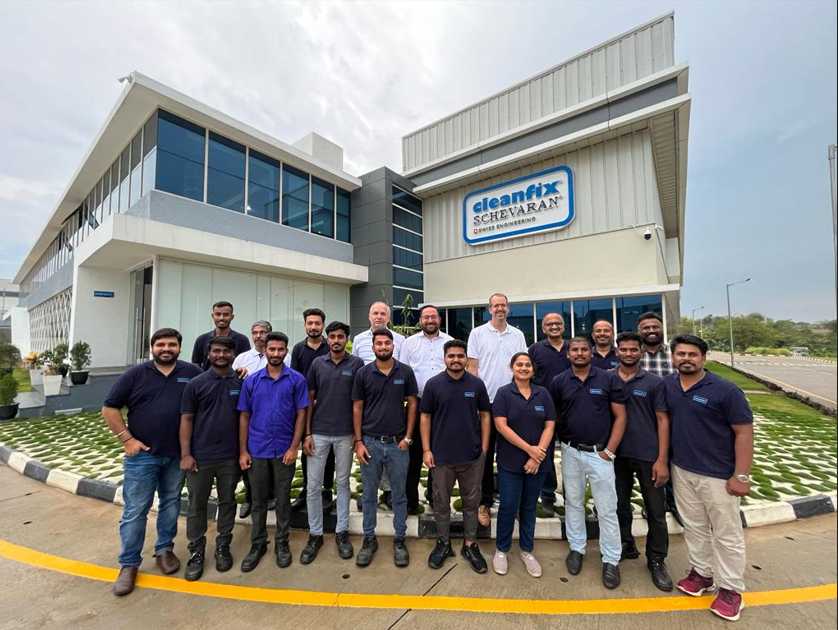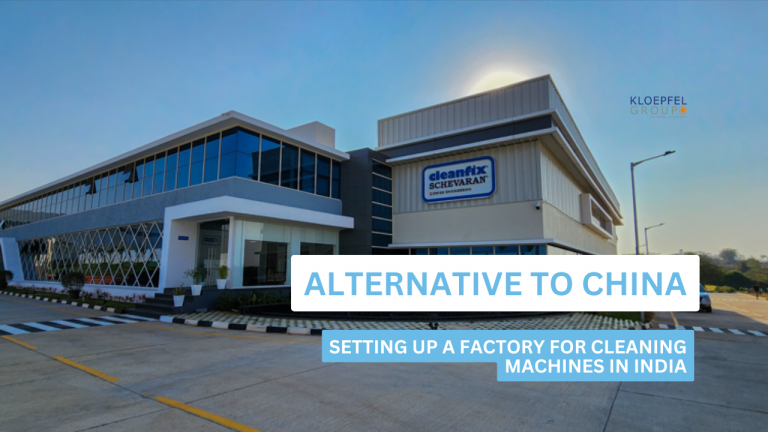Alternative to China – setting up a factory for cleaning machines in India
Projekt Professionals is a leading consultancy specializing in operational transformation and production optimization. Kloepfel Services is an expert in supply chain management and sourcing strategies. Together, they are the operational transformation professionals for SMEs – and not just in India. The two cooperation partners are able to reliably set up factories and supply chains worldwide.
Read in this interview how Projekt Professionals and Kloepfel Services managed to set up a factory in India for Cleanfix, a leading manufacturer of cleaning machines.

How did Cleanfix decide to set up a factory in India?
The country has a population of 1.4 billion people and therefore a large sales potential for the cleaning machines of the Swiss Cleanfix AG. The company has therefore decided to tap into this market – but needs a lower cost base to do so. For this reason, an assembly factory was set up in India with our help. In addition, an Indian partner company was found that operates in an industry-related environment and has the relevant market knowledge. Together, a joint venture was founded, thus laying the foundations for this project.
The main problem for many European companies is that the industry has built up long and fragile supply chains over the last 15 years that no longer function reliably. In addition, there are increasing trade barriers between the USA, China and Europe. Companies often have to choose sides. If a Swiss company produces in China but has customers in America, this can become critical, especially due to punitive tariffs. In addition, labor costs have risen in China. India offers an attractive alternative: low production costs and the possibility of supplying a global customer base.

What role did Project Professionals and Kloepfel Services play in this project?
Kloepfel Services had the task of localizing approx. 1,000 parts in the Indian market. To achieve this, the customer’s purchasing organization and its supplier network were set up, the localization process was defined and the actual localization was carried out up to series production.
The most important task was to ensure the bridging function between Switzerland (sending unit) and the local organization in India. Thanks to the global orientation of Kloepfel Services, we succeeded in doing this extremely well. Within less than a year, we had built up 60 new suppliers.
The task of Project Professionals was to find the right setting for the project. We mediate between the two cultures, set up the local organization of the factory, evaluate external partners on site, introduce processes and ensure stringent project management. In other words, we ensure that the customer always has transparency and the ability to influence what happens in remote India. To achieve this, we use our local network in India of project managers, quality managers, ERP specialists and purchasers. This setting has enabled us to successfully complete every Indian project to date.
Does it make sense for Cleanfix to produce in India and then export these products to Europe, for example?
The factory in India was set up primarily to supply the Indian market. Once the company is established, there is of course further potential for growth. For example, other markets could be opened up in which Cleanfix is currently unable to participate for cost reasons.
Another interesting scenario would be to export the parts manufactured and assembled in India to Switzerland and integrate them into production there. The free trade agreement between EFTA (Switzerland, Liechtenstein, Norway, Iceland) and talks with India plays a key role here. Duty-free import of Indian components for assembly in Switzerland could reduce Cleanfix’s production costs and increase its room for maneuver.
For the time being, the Indian factory supplies the Indian market, while the Swiss factory serves the rest of the world. In this way, we can limit the risk in terms of quality or supply problems geographically.

What are the main challenges on the ground?
The exchange of information and coordination play a central and challenging role. When exchanging data, we always have a sending unit (customer) and a receiving unit (factory in India, suppliers). Sometimes, for example, the customer’s drawings are not up-to-date or not available, the acceptance reports are missing or technical information is incomplete. These problems occur especially when we approach localization or set up the supply chain in India.
Can you give us an example?
For example, the sending unit gives the information that a part is a sheet metal part, but in reality it is a turned part – i.e. an incorrect material category. If we don’t realize this, we ask the wrong suppliers, and so the odyssey begins. That’s why it’s important to ensure that we have a relocatable state at the start of a project or the implementation phase. This means that all the necessary information is available in order to supply the suppliers on site in a qualified manner.
What else do you need to pay attention to?
Basically, all projects have the same project steps. We have developed a standard from this that our customers also use. Nevertheless, there are typical mistakes in a project that can be avoided. For example, the first question we always ask when setting up a project is: What exactly is the assignment? A common mistake is an unclear definition of the assignment. It is important to specify the assignment again before the project begins. A common saying among project managers is “Show me the beginning of a project and I’ll tell you how it ends”.
Another issue is the structuring and coordination of work. For example, machines have to be ordered, which often have long delivery times. This should be brought forward in the planning phase in order to save time later on.
There are also deadlines that are not met. During the weekly project discussions, I often ask my Indian colleagues by when a task will be completed. They tell me the best possible deadline, but this is rarely met. A project plan and budget is usually too optimistic, so Indian projects need more leeway and buffer time to make corrections.
Depending on the location in India, recruiting qualified employees can be a challenge. There is also a “war of talents” in India and specialists are sometimes difficult to find. Especially if the company is not yet known in India.
How do you manage Indian suppliers?
You have to find out when and to what extent you need to involve the head of the Indian supplier. The Indian colleague imagines a component to be something, but it is incomplete and not of the desired quality. This means that communication and escalation at various levels of the supplier are very important. This also applies to your own company and the customer.
It also requires proximity, as there are often many hierarchical levels between the customer’s employee and myself. If I can reduce these, it creates a basis of trust and a good working environment.
Are there other challenges with Indian suppliers?
In India, SMEs are not automatically in pole position, which means that access to the best suppliers is not immediately available.
In addition, framework agreements do not have the same significance in India as they do here, as the system there is more agile. Indian culture is not as linear as a Swiss watch movement, so a contract is often a matter of interpretation and the relationship plays a big role. It is therefore necessary to be on site and visit customers frequently.
What measures are in place to ensure compliance with quality standards?
On a theoretical and conceptual level, Indian culture is very strong. Anyone can have an elevated discussion with me about how a quality plan works. Therefore, we use the standard quality methods. However, there is always the question of implementation at the practical level. For example, when I look at an audit report from a supplier, everything looks perfect. When I am on site, I realize that the person who filled out the report has no understanding of the production process at all. That’s the discrepancy between the theory on paper and the reality on the store floor. The only way to achieve quality is to work on it in partnership, repetitively and on site.
How long will you support Cleanfix?
Our job is to get Cleanfix to the point where the factory is able to operate and optimize itself. Our assignment is limited to 11 months and I think we can manage that.
What is your conclusion?
Indian projects are the most challenging we have ever done. But the benefits can be enormous. Cost reductions of 50% on average with comparable quality are actually possible! Of course, the complexity of the parts and production also plays a role, but our customers are always surprised at the achievable costs.
If a Western European company is considering manufacturing in India, it must be realistic in its strategic planning and take cultural differences into account. Nevertheless, it is possible for a medium-sized company to successfully implement projects of this size today. It requires considerable investment and perseverance, but then India is a great opportunity.
Cleanfix: Robust, efficient, easy to use and durable
Cleanfix is a leading manufacturer of cleaning machines based in Switzerland. The company is known for its high-quality and innovative cleaning solutions developed for both commercial and industrial applications. Cleanfix offers a wide range of products, including dry vacuum cleaners, wet vacuum cleaners, scrubber dryers and sweepers. With a strong focus on quality and reliability, Cleanfix manufactures its machines in Switzerland and relies on state-of-the-art technology and sustainable production methods. The company has made a name for itself by responding to the needs of its customers worldwide and offering customized solutions. On the web at: www.cleanfix.com
Kloepfel Services: Flexibility in purchasing
Kloepfel Services offers companies flexible purchasing and project management capacities with Eastern European experts. These specialists are internationally experienced, speak German, English and other languages, and are familiar with all tools. In uncertain times, Kloepfel enables a quick adjustment of manpower without long-term commitments. The advantages are low labor costs, EU legal certainty and smooth cooperation with international suppliers. Ideal for short-term fluctuations in demand or large projects. Further information at www.kloepfel-services.com
Project Professionals: Realizing industrial complexity
We make sure that your concept is realized. Project Professionals offers first-class project management for companies in the industrial sector. We specialize in factory construction, relocation, industrialization of design and ad-hoc projects. We have many years of experience with projects in India, China, Central Asia and Eastern Europe. Further information at www.project-professionals.ch
Contact:
Kloepfel Group
Damir Berberovic
Tel.: 0211 941 984 33 | Mail: rendite@kloepfel-consulting.com


